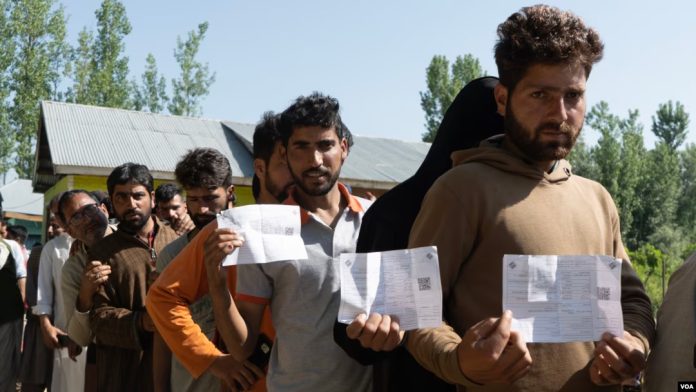Wg Cdr Mahesh Chander Sudan (Retd)
We, the people of Jammu and Kashmir, have recently been privileged to the revival of electoral festivity after a long gap of ten years by Election Commission of India. It is also a historical fact that prolonged absence of democratically elected government for various reasons of administrative and political interests ultimately created a deep dug gap between electors and electorates of the erstwhile State of Jammu and Kashmir resulting in political vacuum. The alternate arrangement provided in the Constitution of India is temporary, short lived and time specific as provided in Articles 355 to 357 and 365 Part XIX and subsequent amendments passed by the Parliament to cater for various situations affecting government functioning in accordance with the Constitution of India. The framers of the Constitution of India intently allowed this temporary arrangement to ensure functioning of the government across the federal units of India as per laid down provisions and at no instance a derailed governance of public resources is to be allowed. However, the people of Jammu and Kashmir were devoid of their democratic rights for various visible and invisible reasons.
The process for holding Legislative Elections has already been set into motion and the three phase elections will be completed by 01 Oct 2024 enabling formation of popular elected government expectedly by 2nd week of October. This would offer an opportunity to voters for casting their mandate in favor of candidates sponsored by contesting political parties besides some Independents. It is going to be first election of the Union Territory, first of its kind with enhanced powers with LG and restricted area of functioning for Elected Chief Minister of the UT limiting governance of resources and creating an instrument for centralized controlled transactions of business remotely. As it now stands, the voters have to helplessly cast their mandate in favor of candidates of their choice and allow democracy to get revived in the given circumstances. The factors likely to influence mandate after an unusual and abnormal gap of ten years would include Revival of stripped State Status, Abrogation of Article 370 and 35A, division of territory into two UTs, Weak Health Infrastructure, unbridled Unemployment, Inflation, Indefinitely delayed legislative elections for political dividend, political instability, terrorism and violence, lack of inclusivity, over and above excessive bureaucratization in the governance of public resources for larger state welfare rather than class and region specific. It is also a challenge for the ruling NDA Government to justify the need for Reorganization Act 2019, Abrogation of controversial but toothless Article 370 and unsustainable delay in holding democratic process of forming popular government post collapse of Alliance between PDP and BJP for years primarily to facilitate unilateral decisions taken thereafter till declaration of Legislative Elections in 2024.
The NDA Government led by BJP has tried all its means and measures to make inroads across the regions of the Union Territory through initiatives like Pahari Reservation, West Pakistanis Proprietary rights over allotted land and enabled them with voting rights to extract political influence especially in the Pir Panchal areas and Kashmir valley. Despite all these out of box ideas, political mandate likely to be guided by serious issues like Abrogation of Article 370 and Statehood restoration is bound to affect the position of party in power. It involves emotive issues hurting ego of the voters that got further substantiated by an unusual delay of almost a decade and excessive bureaucratization, the reliance on administrative system to manage public affairs got seriously intensified post Aug 2019 reorganization of the UT as it cannot substitute for democracy y or an elected government as it fails to reflect the aspirations of the people. Leaving concentrated powers in the hands of administrators and bureaucratic offices added with bureaucrats from outside the Jammu and Kashmir not only defeats the inclusivity in the governance of public resources but also encroaches on traditional political domain.
Issue of restoration of statehood despite assurances given by HM and PM at various platforms continues to play a critical and decisive role in molding public mandate and in the present circumstances it look a distant dream. The issue is getting intensified more and more despite various public welfare schemes and direct addresses by the Lieutenant Governor himself through Awam ki Awaz. Latest changes in the government rules issued before declaration of the Legislative Assembly elections by Chief Election Commission of India confirms that the restoration of the Statehood may not come through in the near future that erodes the trust of the people in government policies. Few cases like new Excise Policy, Illegal mining and deforestation of Lungs area around the Jammu city causes public concern that would also affect public mandate negatively.
In addition to these issues of public concern, the unbridled unemployment in the Union Territory causes a serious issue for youths who are rendered jobless owing to political turmoil, lack of substantial employment policies, and apathetic attitude of the LG administration towards their demands hurts their faith in the system. Surprisingly, the state of Jammu and Kashmir held creditable record of lowest unemployment rate of 15.89% in Jun 2019 but absence of substantial employment polices pushed the graph of unemployment upward around 24% in year 2023.
The people of Jammu and Kashmir are convinced that the restoration of statehood is crucial for the several reasons. Statehood allows better autonomy, healthy inclusivity; increased public participation in decision making that enhances avenues for sustainable development and peace. It therefore indicates that the public mandate for 2024 possibly ushers change, may not align with the ruling party but allow objectivity to prevail so that democracy once again revives, strengthens voice of the citizen to incur transparency and responsiveness in the governance of the public resources in future.
Trending Now
E-Paper


